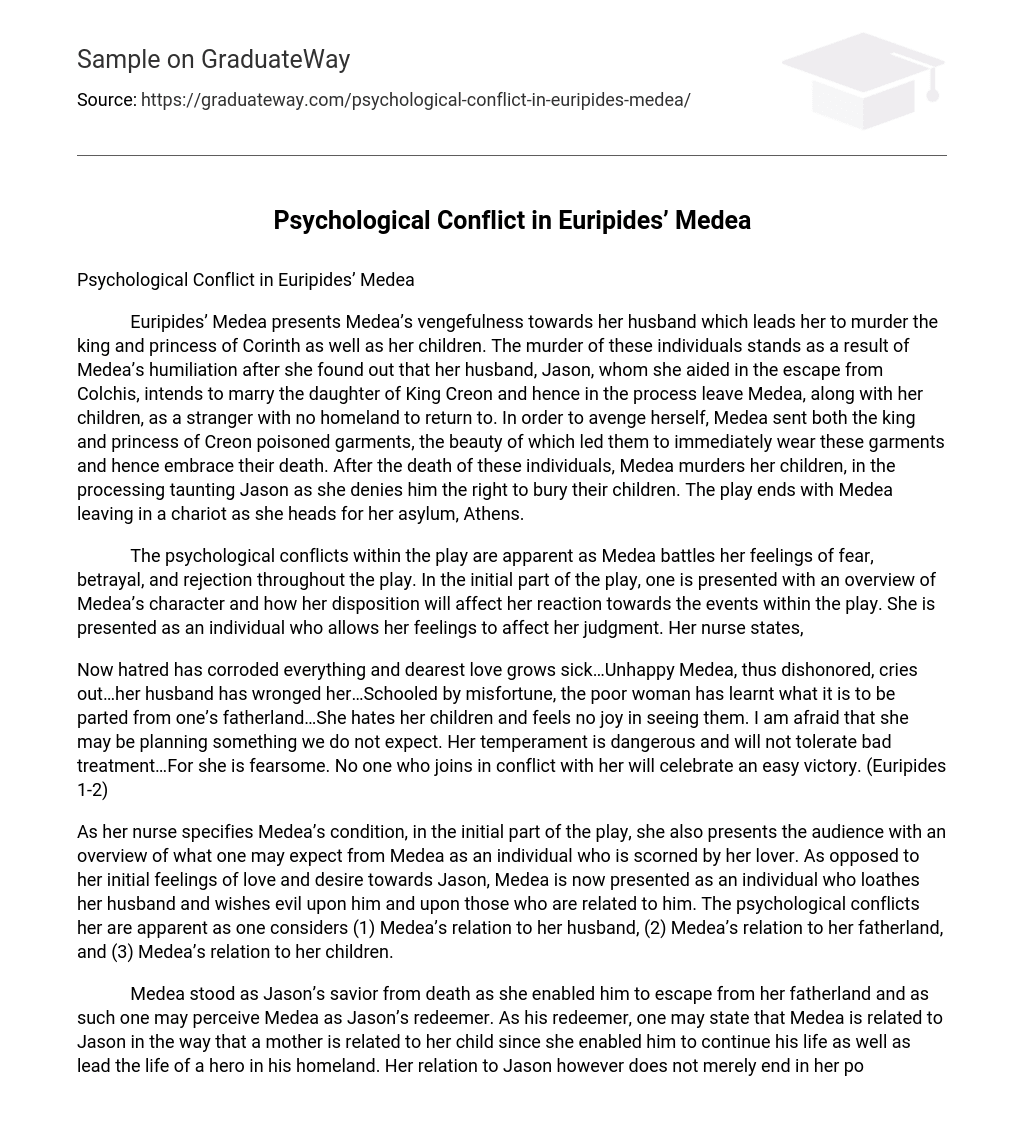Euripides’ Medea presents Medea’s vengefulness towards her husband which leads her to murder the king and princess of Corinth as well as her children. The murder of these individuals stands as a result of Medea’s humiliation after she found out that her husband, Jason, whom she aided in the escape from Colchis, intends to marry the daughter of King Creon and hence in the process leave Medea, along with her children, as a stranger with no homeland to return to. In order to avenge herself, Medea sent both the king and princess of Creon poisoned garments, the beauty of which led them to immediately wear these garments and hence embrace their death. After the death of these individuals, Medea murders her children, in the processing taunting Jason as she denies him the right to bury their children. The play ends with Medea leaving in a chariot as she heads for her asylum, Athens.
The psychological conflicts within the play are apparent as Medea battles her feelings of fear, betrayal, and rejection throughout the play. In the initial part of the play, one is presented with an overview of Medea’s character and how her disposition will affect her reaction towards the events within the play. She is presented as an individual who allows her feelings to affect her judgment. Her nurse states,
Now hatred has corroded everything and dearest love grows sick…Unhappy Medea, thus dishonored, cries out…her husband has wronged her…Schooled by misfortune, the poor woman has learnt what it is to be parted from one’s fatherland…She hates her children and feels no joy in seeing them. I am afraid that she may be planning something we do not expect. Her temperament is dangerous and will not tolerate bad treatment…For she is fearsome. No one who joins in conflict with her will celebrate an easy victory. (Euripides 1-2)
As her nurse specifies Medea’s condition, in the initial part of the play, she also presents the audience with an overview of what one may expect from Medea as an individual who is scorned by her lover. As opposed to her initial feelings of love and desire towards Jason, Medea is now presented as an individual who loathes her husband and wishes evil upon him and upon those who are related to him. The psychological conflicts her are apparent as one considers (1) Medea’s relation to her husband, (2) Medea’s relation to her fatherland, and (3) Medea’s relation to her children.
Medea stood as Jason’s savior from death as she enabled him to escape from her fatherland and as such one may perceive Medea as Jason’s redeemer. As his redeemer, one may state that Medea is related to Jason in the way that a mother is related to her child since she enabled him to continue his life as well as lead the life of a hero in his homeland. Her relation to Jason however does not merely end in her position as a mother figure in his life; she also stands as his lover and his wife. In addition to this, she also stands as the mother of Jason’s children. Given that Medea betrayed her fatherland [her homeland] in order to save Jason, one may state that Medea’s abandonment of her heritage may be seen as an equivalent of her abandonment of her capability to forge a relationship with another individual. The basis for such a claim is the assumption that shedding one’s ties with one’s fatherland or one’s homeland is equivalent to shedding one’s past and one’s experiences from this past. Given that it was through her past that Medea experienced the warmth of filial love, one may state that Medea has also shed the aspects of her life and her identity that enables her to develop such a relationship with other people. If such is the case, her relationship as a mother figure to Jason as well as her children is immediately placed within a dubious position due to her incapability to form such a relationship with other people. Hence, it follows from this that the only tie that binds Medea with Jason is her relationship to Jason as his lover and his wife. In addition to this, it follows that the only tie that binds Medea with her children is their relationship to Jason, in the sense that they stand as the manifestation of her relationship to Jason as his wife and his lover. As can be seen in the later part of the text, as Jason denies and hence destroys his relationship with Medea as his lover and his wife, the foundation of her existence within another land is immediately destroyed along with her feelings of filial love for her children.
The psychological conflict within the text can thereby be seen in Medea’s attempts to destroy her identity as she murders not only the individuals associated with the destruction of her identity but also as she attempts to erase the most evident results of this identity, her children. By allowing her emotions to take control of her actions, Medea thereby enables not only the eradication of her ‘self’ through the eradication of the manifestations of this ‘self’ through the form of her children but also through the form of the individuals that necessitated this self-destruction that Medea adhered to within the context of the play. The psychological conflict that stands as a result of Medea’s relation to her husband, her fatherland, and her children can thereby be seen as Medea chooses to destroy her ‘self’ in order to eradicate her ties to Jason which may be seen as the ultimate form of vengeance as she denies him the mother figure that enabled him to become a hero in his homeland thereby in the process depriving both of them of their past.
Work Cited
Euripides. Euripides: Medea, Hippolytus, Electra, and Helen. Trans. James Morwood. Oxford: Oxford UP, 1997.





